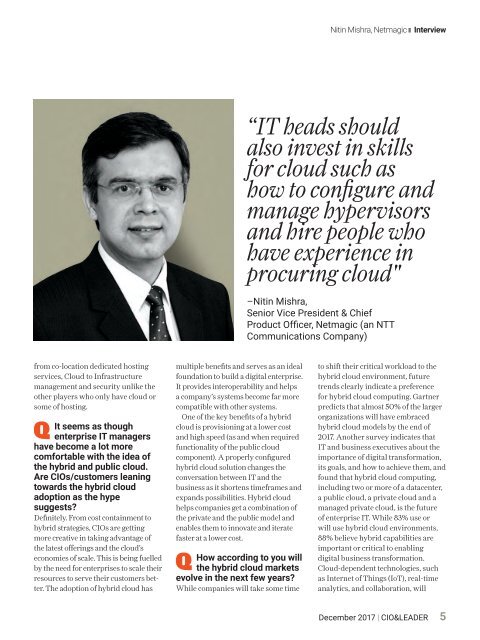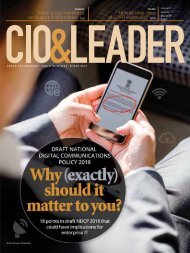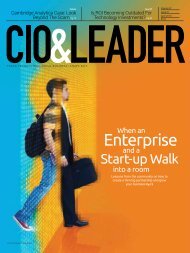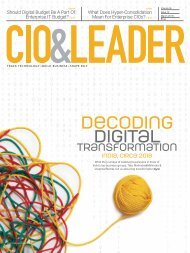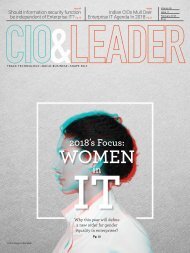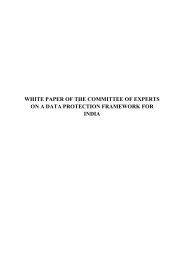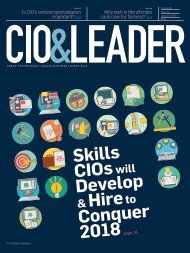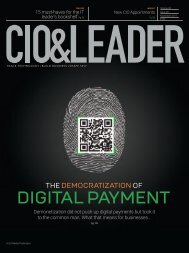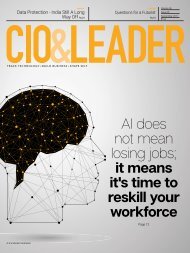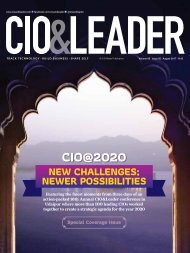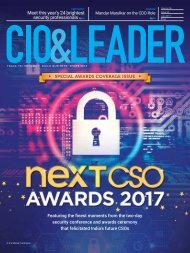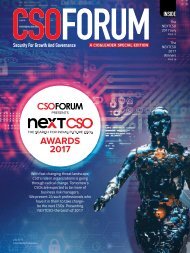C&L_December 2017 (1)
Create successful ePaper yourself
Turn your PDF publications into a flip-book with our unique Google optimized e-Paper software.
Nitin Mishra, Netmagic Interview<br />
“IT heads should<br />
also invest in skills<br />
for cloud such as<br />
how to configure and<br />
manage hypervisors<br />
and hire people who<br />
have experience in<br />
procuring cloud"<br />
–Nitin Mishra,<br />
Senior Vice President & Chief<br />
Product Officer, Netmagic (an NTT<br />
Communications Company)<br />
from co-location dedicated hosting<br />
services, Cloud to Infrastructure<br />
management and security unlike the<br />
other players who only have cloud or<br />
some of hosting.<br />
It seems as though<br />
enterprise IT managers<br />
have become a lot more<br />
comfortable with the idea of<br />
the hybrid and public cloud.<br />
Are CIOs/customers leaning<br />
towards the hybrid cloud<br />
adoption as the hype<br />
suggests?<br />
Definitely. From cost containment to<br />
hybrid strategies, CIOs are getting<br />
more creative in taking advantage of<br />
the latest offerings and the cloud’s<br />
economies of scale. This is being fuelled<br />
by the need for enterprises to scale their<br />
resources to serve their customers better.<br />
The adoption of hybrid cloud has<br />
multiple benefits and serves as an ideal<br />
foundation to build a digital enterprise.<br />
It provides interoperability and helps<br />
a company’s systems become far more<br />
compatible with other systems.<br />
One of the key benefits of a hybrid<br />
cloud is provisioning at a lower cost<br />
and high speed (as and when required<br />
functionality of the public cloud<br />
component). A properly configured<br />
hybrid cloud solution changes the<br />
conversation between IT and the<br />
business as it shortens timeframes and<br />
expands possibilities. Hybrid cloud<br />
helps companies get a combination of<br />
the private and the public model and<br />
enables them to innovate and iterate<br />
faster at a lower cost.<br />
How according to you will<br />
the hybrid cloud markets<br />
evolve in the next few years?<br />
While companies will take some time<br />
to shift their critical workload to the<br />
hybrid cloud environment, future<br />
trends clearly indicate a preference<br />
for hybrid cloud computing. Gartner<br />
predicts that almost 50% of the larger<br />
organizations will have embraced<br />
hybrid cloud models by the end of<br />
<strong>2017</strong>. Another survey indicates that<br />
IT and business executives about the<br />
importance of digital transformation,<br />
its goals, and how to achieve them, and<br />
found that hybrid cloud computing,<br />
including two or more of a datacenter,<br />
a public cloud, a private cloud and a<br />
managed private cloud, is the future<br />
of enterprise IT. While 83% use or<br />
will use hybrid cloud environments,<br />
88% believe hybrid capabilities are<br />
important or critical to enabling<br />
digital business transformation.<br />
Cloud-dependent technologies, such<br />
as Internet of Things (IoT), real-time<br />
analytics, and collaboration, will<br />
<strong>December</strong> <strong>2017</strong> | CIO&LEADER<br />
5


